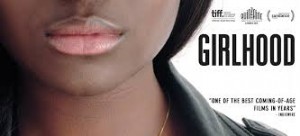As we prepare for the screening of the film Girlhood, a story of a teenage girl navigating the complexities of her life, exploring her perceived choices (and lack thereof), a reminder that included in your resource binder, or you can also find them here, https://wexpagesonline.edublogs.org/files/2015/07/GirlhoodResources-1lsg18s.pdf, are a few examples of related literary works to inspire our thinking.
Image: Strandreleasing.com
Included are poems and short stories by Gwendolyn Brooks, Nikki Giovanni, Rita Dove, Emily Dickinson, Alice Walker, and Amy Tan… There are some male authors in the mix as well, but considering this film focuses its main character on the female voice, writings by female authors are a natural compliment.
As with the film, some of the included literary works (poems and short stories) uncover universal themes and experiences, while others are more nuanced, complicated, or culturally specific. These literary works are great starting points, as each piece offers its own big open questions, allowing enough troubling space for students to get lost in discussion and written reflection, opening up many entry points that not only intersect with the film, but also encourage creative and critical thinking.
Making space for students to wonder about some of these big messy contexts first gives them permission to wonder without a specific end point, deadline, or contrived purpose in mind. And often while students are conflicted, concerned with the end-game, the purpose, the point, the why they are doing something in school, the big messy open-ended questions raised in these poems and short stories, much like the film, offer no easy resolution, no neat and tidy answer or outcome. This will certainly frustrate some students, but will also allow them to take their own risks (sometimes calculated, sometimes messy) in their wonder, then maybe just maybe, translate some of that messy wonder into their writing.
Here are a few examples of big messy questions to wonder about in the context of this film:
What is on the other side of this choice?
What if I dare to dream?
What happens when someone tries to take away my voice?
What does my voice sound like?
Whose life is this anyway?
How do you know it’s love?
What if I make “the wrong” decision?
Who do you think you are?
Who do I think I am?
Who is in control of this situation?
What do I do now?
To get to tomorrow, what do I need to do today?
-Dionne
